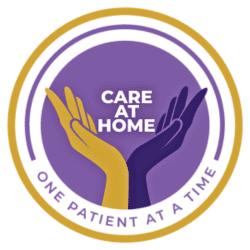
Your loved ones deserve to age with dignity. Finding the best long-term care solution for elderly family members can be a daunting and overwhelming process. Live-in care offers an excellent alternative to nursing homes and assisted living facilities. Suitable for all seniors, including those with medical needs or dementia, live-in home care provides companionship and help with daily tasks, allowing your loved one to maintain their independence. Live-in caregivers can operate full-time or during specific times of the day (e.g., overnight), so you can customize your loved one’s care plan to fit your family’s situation.
In this guide, we’ll explain everything you need to know before hiring a live-in caregiver, including what caregivers do, how much they cost (and funding options), and what types of live-in care are available.
What Do Caregivers Do?
Live-in care is divided into two categories: Arrangements where the caregiver is provided with room and board (that is, food and a place to sleep in the home) and those where the caregiver works at the client’s home but resides elsewhere. Though both care plans provide companionship and support with daily activities, they differ in cost and the amount of care provided. Below, we’ll explain the difference between live-in care, 24-hour care, and overnight/daytime care assistance.
Live-In Care
Live-in care is where one caregiver provides care 5-7 days a week at the client’s home. For this type of care, a room and bed must be provided in the client’s home for the caregiver.
During workdays, the caregiver resides at the client’s home, meaning they’re present 24 hours a day; however, the caregiver is given eight hours to sleep and a two-hour break each day. Depending on the arrangement you have with your caregiver, they may be interrupted during breaks should the client need urgent assistance.
Live-in care is ideal for situations wherein a senior relies on family members who work during the week but who can provide support on evenings and weekends. However, live-in care can also be adjusted to meet the needs of seniors living alone. For example, families can hire an alternative caregiver to visit their loved one during the primary caregiver’s days off.
24-Hour Care
24-hour in-home care provides an alternative to a care facility or nursing home for seniors with more complex care needs. Instead of a single live-in caregiver, several caregivers provide full-time assistance to the client in a series of rotating shifts, so the client is never left unattended during the day or night. Unlike live-in care, 24-hour care does not necessarily require the client to provide a room or bed for his or her caregivers. However, depending on the client’s needs, caregivers may be given a short break during their shifts.
24-hour care is typically recommended for seniors with limited mobility, short-term memory problems that could endanger them, or medical conditions that require around-the-clock monitoring. Because caregivers are paid an hourly rate, this type of care is the costliest and is thus generally reserved for those with high care needs.
Overnight/Daytime Care
Overnight care provides support for seniors before bed, overnight, and during their morning routine. In this situation, the caregiver may be given a sleeping area but remain available should the client need assistance. Alternatively, the caregiver may live with the client and provide care during the daytime hours but take nights off or work nights only on an on-call basis.
Overnight or daytime care is an excellent option for seniors with low or intermittent care needs. Families may use this type of care to ensure their loved one is supported while they’re asleep or at work, or during times of the day when their loved one needs extra assistance. For example, seniors who have difficulty getting dressed, brushing their teeth, etc., due to arthritis pain often benefit from help during the mornings and evenings.
What Services Are Provided by a Live-In Companion for Elderly People?
The services of live-in caregivers vary somewhat depending on the client’s needs, though they’re generally like those offered by other home health aide and home care workers. While looking after your loved one, an in-home caregiver will perform four primary duties:
-
Companionship
One of the most important and valuable aspects of having a live-in caregiver is the companionship they provide. In addition to tending to your loved one’s basic needs, a caregiver will keep your family member company, engage them in conversation, and help them access social and recreational opportunities in their community.
-
Personal Care
A live-in caregiver will help your loved one look and feel their best by assisting with dressing, bathing, grooming, personal hygiene and assist in keeping your loved one safe.
-
 Assistance With Daily Living
Live-in caregivers play an active role in many areas of their client’s daily routines, allowing them to maintain a full and active life. A live-in caregiver can help your loved one run errands and get to medical appointments, keep their home clean and tidy, and prepare nutritious meals, for instance.
-
Health Monitoring
While live-in caregivers can’t perform the duties of a doctor or nurse, they can help keep track of your loved one’s health and ensure they follow their medical care plan. Similar to a home health aide, they can prompt medications, observe certain medical conditions (such as diabetes), and monitor vital signs.
What Are the Benefits of Hiring a Live-In Caregiver?
Live-in home care offers multiple advantages over nursing homes, including:
-
Improved Health & Safety
Unlike nursing homes and assisted living facilities, in-home caregivers offer attentive one-on-one care. By remaining with your loved one throughout the day, a caregiver reduces their risk of falls and injuries. In-home care is also safer than communal living situations because it presents a much lower risk of infection.
-
Greater Freedom and Independence
With in-home care, your loved one will be free to come and go as they please, with no restrictions on their activities. They will also be able to own pets (which is forbidden in most residences) and maintain full control over their meals and mealtimes. In many cases, being able to cook at home results in improved nutrition and health.
-
Social Engagement
According to the National Institute on Aging, ensuring elderly family members stay socially engaged can lower the risk of high blood pressure, heart disease, depression, anxiety, dementia, Alzheimer’s disease, and more. By choosing in-home care, you’ll allow your loved one to remain in their community, surrounded by friends and neighbors, significantly reducing their risk of becoming isolated. Likewise, your family member’s caregivers will provide daily companionship and conversation.
-
Familiarity & Comfort
Your loved one’s home contains years – even decades – of memories. By helping your family members remain in their familiar environment, you’ll ensure they’re surrounded by comforting sights, sounds, and reminders.
What Should You Do Before Hiring Someone For Live-In Home Care?
Before hiring a live-in caregiver, you’ll need to create an agreement outlining the parameters of the care arrangement. Doing so protects you, your loved one, and the caregiver, as in-home care remains unregulated in many parts of the United States. Your agreement should specify:
- How many hours will the caregiver be expected to work (including on-call hours)?
- The caregiver’s hourly rate of pay (including overtime rates).
- How much of the caregiver’s total pay will go towards room, board, and other accommodations?
- Any areas of the home which are off limits.
- House rules.
- Conditions for ending the contract (so your loved one’s care is not interrupted by sudden termination).
If you hire through a home care agency, the agency will likely provide a contract, saving you the difficulty of creating one. Home care agencies also perform a thorough background check on each of their employees, ensuring safe, reliable service.
What’s The Cost of a Live-in Caregiver?
The cost of live-in care varies widely across the United States, but it’s almost always cheaper than nursing home care. The rate of private duty pay for caregivers is usually between $22-27 an hour. As such, part-time care may cost as little as $2000 per month, while full-time care can cost up to $8,000 per month, depending on where you live. Nursing home care, on the other hand, costs an average of $12,000 per month (for a private room).
How Live-In Caregivers Are Paid: Funding Options for Home Care
To offset the cost of live-in care, there are several options you can consider:
-
Medicaid
Though Medicare doesn’t cover the cost of a live-in caregiver, Medicaid may cover a portion of your loved one’s care. Because Medicaid coverage varies significantly by state, you will need to check your state’s regulations to determine if Medicaid will fund in-home care.
-
Veterans’ Assistance
Veterans’ Assistance doesn’t have a specific program for in-home care, but if you’re a veteran (or a veteran’s spouse), you may be able to use the Veteran-Directed Care Program or Veterans’ Pension to help cover the cost of care.
-
Reverse Mortgage
For seniors who own their own homes, reverse mortgages provide a straightforward way to pay for live-in care. When your loved one takes out a reverse mortgage, they will receive a portion of the equity in their home in the form of a monthly payment. Usually, this loan does not have to be paid back while the homeowner is alive, provided they don’t sell their home.
-
Insurance
Standard medical insurance typically does not cover the cost of in-home companion care for seniors. However, in some cases, your loved one may be able to withdraw their life insurance early to pay for live-in care. This process may take the form of a loan against the policy amount or cashing in the policy directly.
Get Help For Your Loved One
If you have an elderly family member who would prefer to “age in place†at home, live-in care will honor their wishes while keeping them safe, healthy, and socially engaged. To learn more about in-home care for seniors, contact our team today:
One Patient at a Time (OPAAT) Homecare Services
860-788-2437
We’ll be happy to discuss your options, help you find funding, and create a custom care plan for your loved one.
Meta: Learn how to get exceptional care for seniors in your life

No responses yet